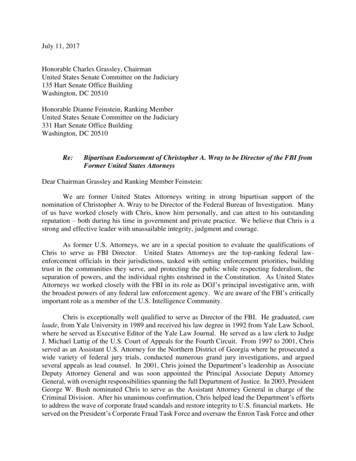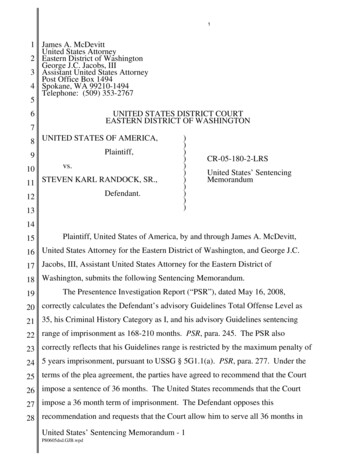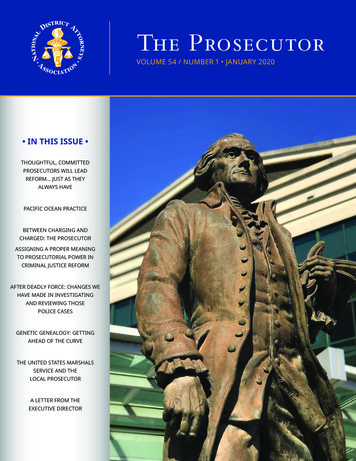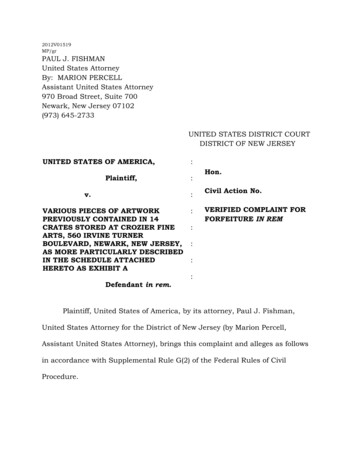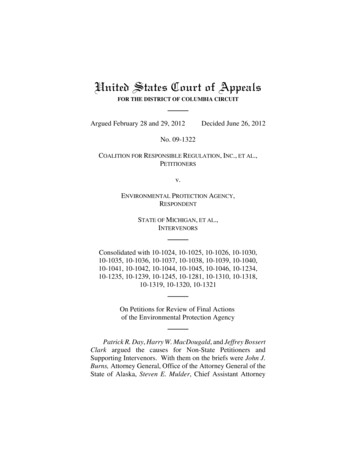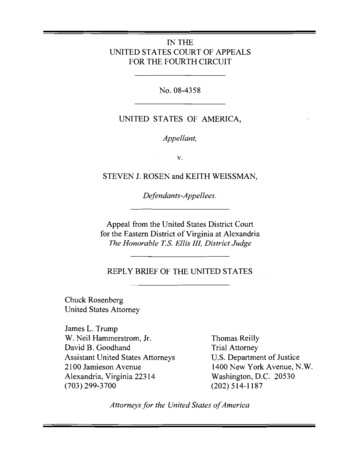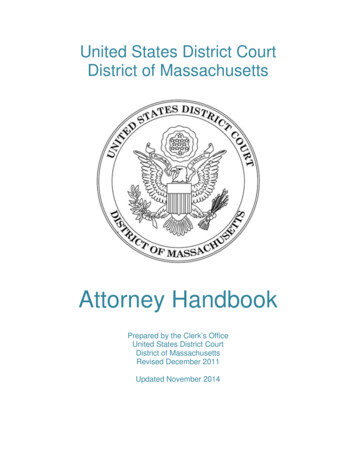
Transcription
United States District CourtDistrict of MassachusettsAttorney HandbookPrepared by the Clerk’s OfficeUnited States District CourtDistrict of MassachusettsRevised December 2011Updated November 2014
www.mad.uscourts.govTable of ContentsINTRODUCTION . 1MISSION STATEMENT . 2ALTERNATIVE DISPUTE RESOLUTION . 3APOSTILLE. 3APPEALS . 4TO THE COURT OF APPEALS FOR THE FIRST CIRCUIT . 4TO THE FEDERAL CIRCUIT COURT OF APPEALS . 4BAIL . 4CASH . 4COLLATERAL OTHER THAN CASH OR REAL PROPERTY . 5DISCHARGE OF MORTGAGE . 5REAL ESTATE OR OTHER REAL PROPERTY AS SURETY . 6RETURN OF CASH BAIL . 6BANKRUPTCY . 7APPEALS TO THE DISTRICT COURT . 7MOTION FOR LEAVE TO APPEAL . 7MOTION FOR STAY PENDING APPEAL . 8WITHDRAWAL OF REFERENCE . 8BAR . 8ADMISSION . 8CERTIFICATE OF GOOD STANDING . 9COURTROOM OPPORTUNITIES FOR RELATIVELY INEXPERIENCEDATTORNEYS. 9DUPLICATE CERTIFICATE OF ADMISSION . 9PRO HAC VICE ADMISSION . 9BILL OF COSTS . 10CAMERAS IN THE COURTROOM PILOT PROJECT . 10CASE ASSIGNMENT . 10CASE FILES . 11CASE INFORMATION . 11CASE NUMBERS: WHAT THEY MEAN . 12CENTRAL VIOLATIONS BUREAU . 13United States District CourtDistrict of MassachusettsPage iAttorney HandbookUpdated November 2014
www.mad.uscourts.govCERTIFICATE OF SERVICE . 13CERTIFICATION OF JUDGMENT . 13FOR REGISTRATION IN ANOTHER JURISDICTION . 13FOR REGISTRATION IN THIS DISTRICT OF A JUDGMENT ENTERED INANOTHER JURISDICTION . 14CHANGE OF ADDRESS. 14CIVIL ACTIONS –NEW, INCLUDING NOTICES OF REMOVAL . 14CRIMINAL JUSTICE ACT (CJA) . 16DUTY ATTORNEY (Boston) . 16EVOUCHER/PAYMENT . 16PANEL OF ATTORNEYS . 16CLERK’S OFFICE LOCATIONS AND HOURS . 17CM/ECF . 18HELP DESK RESOURCES . 19COPY REQUESTS . 19CORPORATE DISCLOSURE STATEMENT. 19COURT CALENDAR (DAILY DOCKET) . 20COURT DIRECTORY . 20COURT REPORTERS . 20DEFAULT JUDGMENT: STANDING ORDER. 20DISCOVERY DOCUMENTS . 20THE DOCKET SHEET . 21E-GOVERNMENT ACT OF 2002 . 22ELECTRONIC DEVICES AND PHOTOGRAPHIC EQUIPMENT . 23EMERGENCY BUSINESS . 23DURING NORMAL BUSINESS HOURS . 23OUTSIDE OF BUSINESS HOURS. 24EX PARTE DOCUMENTS . 24EXEMPLIFICATION CERTIFICATES . 24EXHIBITS: TRIAL . 24FEDERAL PUBLIC DEFENDER . 25FEDERAL RECORDS CENTER . 25FEES . 26ACCEPTABLE FORMS OF PAYMENT. 26PAY.GOV . 26United States District CourtDistrict of MassachusettsPage iiAttorney HandbookUpdated November 2014
www.mad.uscourts.govFILING BY FAX OR EMAIL . 27FORM AND SIGNING OF PAPERS. 27FORMS . 27GENERAL COURT ORDERS . 27INCLEMENT WEATHER. 27INDICES. 28INTEREST RATES:. 28POST-JUDGMENT. 28PRE-JUDGMENT . 29INTERNET ACCESS (MOAKLEY COURTHOUSE ONLY) . 29IN THE COURTROOM . 29IN THE COURTHOUSE . 29INTERPRETERS. 30JUDICIAL MISCONDUCT . 30JURISDICTION . 30JURY EVIDENCE RECORDING SYSTEM (JERS). 31JURY INFORMATION . 32FOR ATTORNEYS . 32FOR JURORS . 32LEGAL HOLIDAYS AND OBSERVANCES . 32LENGTH OF MEMORANDA . 32LIENS . 32ABSTRACTS OF JUDGMENT . 32INTERNAL REVENUE SERVICE . 33OTHER . 33LOCAL RULES . 33MEDIA ACCESS . 34MEDICAL RECORDS . 34MISCELLANEOUS BUSINESS DOCKET . 35MULTIDISTRICT LITIGATION . 35NATURALIZATION . 36OPINIONS SEARCH . 36PACER . 37PACER CASE LOCATOR . 37United States District CourtDistrict of MassachusettsPageiiiAttorney HandbookUpdated November 2014
www.mad.uscourts.govPRESENTATION EQUIPMENT . 38PRO BONO PROGRAM . 38PRO BONO MEDIATION PROGRAM. 39PRO SE LITIGATION . 39QUALITY ASSURANCE. 39QUI TAM (WHISTLE BLOWER OR FALSE CLAIM ACT) CASES . 39REDACTION OF HIDDEN TEXT AND METADATA . 40REENTRY PROGRAMS . 40CARE (Court Assisted Recovery Effort) . 40RESTART (Reentry: Empowering Successful Todays And ResponsibleTomorrows) . 40REGISTRY FUNDS: DEPOSIT OF MONEY INTO THE REGISTRY OF THE COURT 40REQUESTS FOR EXTENSION OF TIME . 41REQUESTS FOR HEARING . 41SEALED OR IMPOUNDED DOCUMENTS . 41SECURITY . 42STANDING ORDERS . 42SUMMONS . 43CIVIL ACTION . 43SERVICE ON U.S. GOVERNMENT . 43SUBPOENA . 44CIVIL . 44CRIMINAL . 44SUPERSEDEAS BOND . 45SUPPLEMENTARY PROCESS . 45FROM AN ACTION FILED IN ANOTHER JURISDICTION . 45FROM AN ACTION FILED IN THIS DISTRICT . 45WRIT OF ATTACHMENT . 45WRIT OF EXECUTION . 46TAXATION OF COSTS . 46TRAINING . 46TRANSCRIPTS . 47ORDERING . 47TRANSCRIPT REDACTION POLICY . 47APPENDICES . 48United States District CourtDistrict of MassachusettsPage ivAttorney HandbookUpdated November 2014
www.mad.uscourts.govSAMPLE CIVIL DOCKET . 49COMMON PROCEDURES AND REQUIRED FORMS . 512014-2019 LEGAL HOLIDAYS AND OBSERVANCES . 52CENTRAL VIOLATIONS BUREAU . 53GLOSSARY OF LOCAL TERMS AND ACRONYMS . 55SEARCH GUIDELINES . 57United States District CourtDistrict of MassachusettsPage vAttorney HandbookUpdated November 2014
www.mad.uscourts.govINTRODUCTIONThis handbook is intended to provide the public and the bar of the United States DistrictCourt for the District of Massachusetts with information needed to conduct businesswith the court. We hope that this reference guide will answer any questions that youmay have concerning such areas as preparation of documents, federal holidays,addresses and contact information for all sections of the court. We believe that thishandbook, when used in conjunction with the Federal Rules of Civil Procedure, theFederal Rules of Criminal Procedure, the Local Rules for the District of Massachusettsand the CM/ECF Administrative Procedures will not only be beneficial to those alreadyfamiliar with the court, but also to the paralegals, administrative assistants, and pro selitigants who have had little or no contact with the federal court system. Although wehave made every effort to provide the most current and accurate information possible, ifthere is any conflict between this handbook and the Local or Federal Rules ofProcedure, then the Rules shall govern.My staff and I will do everything possible to ensure prompt and efficient service. We arehere to answer any questions that you may have, so please feel free to contact us forassistance. We welcome any comments or suggestions for improving this Handbook.Please forward your comments to our online comment form at www.mad.uscourts.gov.Robert M. FarrellClerk of CourtUnited States District CourtDistrict of MassachusettsPage 1Attorney HandbookUpdated November 2014
www.mad.uscourts.govMISSION STATEMENTWe, the staff of the clerk's office, are dedicated to providing access to an impartial forumfor the resolution of disputes, through prompt service to the court, members of the bar,and the public. Our services include processing civil and criminal cases, maintainingrecords, assembling juries, disseminating information on the activities of the court, andproviding other administrative and management support to the court and its affiliates.United States District CourtDistrict of MassachusettsPage 2Attorney HandbookUpdated November 2014
www.mad.uscourts.govALTERNATIVE DISPUTE RESOLUTIONThe Alternative Dispute Resolution Act of 1998 requires that each district courtauthorize the use of Alternative Dispute Resolution (ADR) in all civil actionsincluding adversary proceedings in bankruptcy. 28 U.S.C. § 651 et seq.Parties in all civil cases are encouraged to participate in at least one of the ADRprograms that are available through this court. ADR options are designed so thatthe parties may adopt or adjust an existing program to one which will meet theneeds of their dispute. Unless otherwise agreed upon, these programs are nonbinding. The parties are not required to accept any results or recommendations.Except for special masters and private providers of ADR services, the programsavailable through the court are without cost to the participants.A majority of the cases referred to ADR are assigned to the senior judges andmagistrate judges of this court. Documents submitted in conjunction with the ADRprocess are not part of the record and are not to be filed through CM/ECF. Ifsubmitted through the clerk’s office, the documents must be identified as ADRrelated so that the clerk will not include the filing on the court docket.Contact:the ADR Program Coordinator at 617-748-9222APOSTILLEIn 1981, the United States ratified the Hague Convention Abolishing theRequirement of Legalization for Foreign Public Documents. The purpose of theHague Convention is to simplify the procedures by which official documents of onecountry are authenticated for use in another country. The effect of the Convention isto eliminate the chain of certification, replete with red tape and seals, and tosubstitute a simple, single certification known as an apostille.In each country adopting the Hague Convention, an office or authority has beendesignated to certify documents, for the purpose of the Convention, for use in othercountries which have also adopted the Convention. Clerks of court and deputyclerks are the officials authorized under the Convention to issue certificates in thiscountry relating to the official records maintained in the District Court.A fee is charged for the apostille in accordance with the Judicial ConferenceSchedule of Fees. The fee for the apostille is added to any fee imposed for copyingand certifying the underlying documents.Contact:the Customer Service staff at 617-748-4223United States District CourtDistrict of MassachusettsPage 3Attorney HandbookUpdated November 2014
www.mad.uscourts.govAPPEALSTO THE COURT OF APPEALS FOR THE FIRST CIRCUITThe notice of appeal is filed with the district court clerk’s office. The filing fee, foundon the fee schedule, is paid to the clerk of the district court. The filing party isdirected to the website for the First Circuit Court of Appeals to obtain the TranscriptReport/Order Form and Instructions.The district court clerk’s office is responsible for transmitting the appeal and recordto the first circuit. The clerk’s office generally transmits the record to the court ofappeals within twenty one days, unless requested earlier by that court.Contact:the district court Appeals Coordinator at 617-748-9157TO THE FEDERAL CIRCUIT COURT OF APPEALSThe federal circuit court of appeals has nationwide jurisdiction in a variety of subjectareas including but not limited to international trade, government contracts, patents,trademarks, certain money claims against the United States government, federalpersonnel, and veterans' benefits.Notices of appeal to the federal circuit court of appeals are processed by the districtcourt clerk’s office in the same manner as notices of appeal to the first circuit courtof appeals, except that the federal circuit does not require the transmission of therecord from this court.The filing fee is the same amount that is due for appeals to the first circuit court ofappeals.Contact:the district court Appeals Coordinator at 617-748-9157BAILCASHIf a cash bail is set as a condition of release, the courtroom deputy clerk for theassigned judicial officer will coordinate with the financial office for the payment ofthe funds. A person depositing funds on behalf of a defendant will also be requiredto execute an affidavit (available from the clerk’s office) regarding the deposit ofcash. A deputy clerk, usually from the financial office, will witness the signing andprovide a copy of the affidavit, along with a receipt, to the person depositing thefunds.United States District CourtDistrict of MassachusettsPage 4Attorney HandbookUpdated November 2014
www.mad.uscourts.govThe affidavit also includes information regarding the procedure to be followed forreturn of the bail money upon completion of the caseThe preferred method of payment for a cash bail is a bank or cashier's check.Payment of bail by cash is not encouraged. Should the clerk’s office receive a cashpayment over 10,000, IRS Form 8300 shall be executed and filed with the InternalRevenue Service.Funds deposited into the Registry of the Court in connection with a criminalproceeding will not be invested without an order of the Court.Contact:the Financial Manager at 617-748-9134COLLATERAL OTHER THAN CASH OR REAL PROPERTYIf another form of collateral, other than real property, is set as a condition of release,the courtroom deputy clerk will coordinate the surrender of the security pursuant toestablished clerk’s office procedures. This security, with the approval of the court,may be in the form of (but not limited to): a bank account passbook, certificates ofdeposit or stock certificates.An appropriate receipt will be issued to the owner of the collateral by the deputyclerk accepting it.Contact:the courtroom deputy clerk assigned to the judicial officer who setthe bailDISCHARGE OF MORTGAGEOnce the criminal case is terminated or the defendant is incarcerated pending trial,the surety who posted the real property may request, by motion, that the bond beexonerated. Upon allowance of the motion, a discharge of mortgage will beprepared by the clerk’s office for the clerk’s signature. This document must then befiled by the surety with the appropriate registry of deeds.See Return of Cash BailContact:the docket or courtroom deputy clerk assigned to the presidingjudicial officerUnited States District CourtDistrict of MassachusettsPage 5Attorney HandbookUpdated November 2014
www.mad.uscourts.govREAL ESTATE OR OTHER REAL PROPERTY AS SURETYReal estate may be posted as security for bail when allowed by the court.Information (Procedures for Posting of Real Property), and samples of documents(Escrow Agreement and Mortgage) are available in the clerk’s office and on thecourt website detailing the necessary procedures.In instances where real property is to be posted as collateral, the defendant andsureties/owners of the property will sign the bond, agreeing to the forfeiture of thatproperty in the event the defendant defaults on the bond and/or the conditions ofrelease. The defendant’s attorney must submit a prepared mortgage, escrowagreement, and quitclaim deed at the direction of the court.The defendant's attorney shall be required to record the mortgage, and to provideproof of same to the clerk of court after processing (i.e., a copy containing theRegistry's filing stamp, book and page number, etc.).Contact:the courtroom deputy clerk assigned to the judicial officer who hasset bail and/or the conditions of release.RETURN OF CASH BAILUpon disposition of the case a Motion for Release of Bail shall be filed with thecourt. If a cash deposit is to be returned to someone other than the originaldepositor, the “assignment of bail” section of the original bail affidavit (signed whenthe bail was posted) shall be completed, notarized, and filed with the motion.A refund, in the form of a U.S. Treasury check, should be available within seven (7)working days after receipt of a court order directing release of funds. The refundshall be sent via FedEx or certified mail to the address indicated on the receipt, orthe owner may make arrangements to pick up the check at the clerk's office. Photoidentification must be presented if the check is picked up in the clerk’s office.Contact:the Financial Office at 617-748-9136United States District CourtDistrict of MassachusettsPage 6Attorney HandbookUpdated November 2014
www.mad.uscourts.govBANKRUPTCYMatters arising under Title 11 of the United States Code are presented to thebankruptcy court, which routinely adjudicates the issues presented. This automaticreference is made pursuant to 28 U.S.C. § 157(a) and Local Rule 201.The bankruptcy court website is www.mab.uscourts.gov.APPEALS TO THE DISTRICT COURTThe district court's jurisdiction over appeals from decisions of the bankruptcy courtis created by 28 U.S.C. § 158(a). The notice of appeal from a ruling of a bankruptcyjudge shall be filed in the bankruptcy court, along with the filing fee payable to“Clerk, United States Bankruptcy Court.”The appellant must elect, in writing, at the time the notice of appeal is filed, toproceed before the district court on appeal. If no election is made, then the caseshall be transmitted to the bankruptcy appellate panel for further proceedings.If the appellant elects to proceed before this court, the bankruptcy clerk shalltransmit the record to the district court clerk’s office where it shall be assigned to ajudge by random draw, and given a civil action number. Multiple appeals arisingfrom the same bankruptcy action shall be assigned separate case numbers, butshall be assigned to the same district judge, absent an order of the district court.Contact:the Customer Service office at 617-748-9124MOTION FOR LEAVE TO APPEALA Motion for Leave to Appeal shall be filed in the bankruptcy court. That court willforward the necessary record to the district court clerk’s office. The motion for leaveto appeal will be assigned a civil action number. Should the motion be allowed, allsubsequent papers (including the notice of appeal) shall be filed in that civil action.Contact:the Customer Service office at 617-748-9124United States District CourtDistrict of MassachusettsPage 7Attorney HandbookUpdated November 2014
www.mad.uscourts.govMOTION FOR STAY PENDING APPEALA Motion for Stay Pending Appeal of a Bankruptcy Court Order is filed with theBankruptcy Court and then transmitted by that court to the district court clerk, whoassigns the motion a civil action number. When the appeal is later transmitted to thedistrict court, it is assigned the same case number as the previously filed motion forstay.NOTE: If the motion is an emergency motion, the original motion is to be filed in theBankruptcy court with a courtesy copy to the district court.Contact:the Customer Service office at 617-748-9124WITHDRAWAL OF REFERENCEIn matters in which a statute provides for trial before a district judge, counsel mayrequest that reference to the bankruptcy court be withdrawn and that the matter beheard in the district court. In that situation, the application or motion is filed with thebankruptcy court, which in turn shall transmit it to the district court. A civil actionnumber shall be assigned and a district judge shall be chosen by random draw. Ifthe district court grants the motion to withdraw the reference, then the case shallproceed in the district court in the usual manner.Contact:the Customer Service office at 617-748-9124BARADMISSIONApplications for admission to the bar of this court must be submitted on-line, iate.html. A Certificate of GoodStanding from the Massachusetts Supreme Judicial Court (scanned to a PDF file) isalso required and must be uploaded as part of the application process. Theapplication f
Attorney Handbook District of Massachusetts Updated November 2014 . INTRODUCTION . This handbook is intendedto provide the public and the b ar of the United States District Court for the District of Massachusetts with information needed to conduct business with the court. We hope that this reference guide will answer any questions that you
